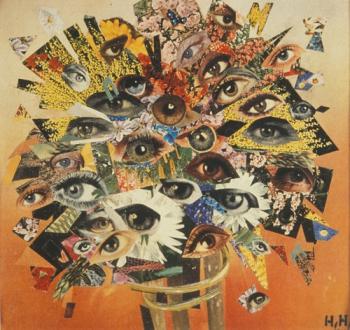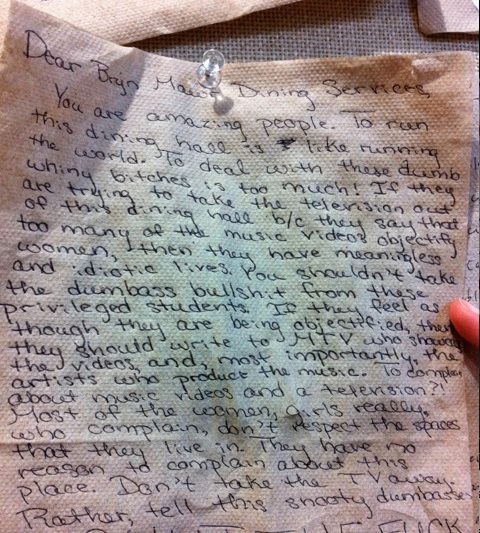Serendip is an independent site partnering with faculty at multiple colleges and universities around the world. Happy exploring!
Hummingbird's blog

Dance and Silence
On Friday evening, I was lucky enough to be able to attend the Volshky Ukrainian Dance Ensemble’s performance at Goodhart Auditorium here at Bryn Mawr. I was impressed by their performance first and foremost because of their talent, but secondly because it reminded me very much of the work on silence we’ve done so far in this class. I haven’t been formally trained in dance – except some basics of ballroom – but I do understand the way dance is used as an outlet for expression. I find this particularly interesting because dance is such a visceral way of expressing oneself, but at the same time, it’s silent. At one point in the Volshky performance, a male and female dancer embraced on the stage – after dancing away from and around each other for much of the dance. A number of people in the audience (myself included) responded to the embrace with a resounding, “Aww!” The way a movement can evoke an emotional response in people showed me the way we can communicate silently.

Robin Hood versus Criminal
When reading “Prisoners of a Hard Life” (PHL) I felt outraged. The level of mistreatment, the utter waste, and the general lack of compassion these women faced (and still face) shocked and frustrated me. I couldn’t understand how people like Denise could be treated the way they were. I followed up the PHL reading with Colored Amazons, however, and began to feel a change of heart. As I read, I couldn’t stop thinking I was missing something or wasn’t getting the full picture. Though, like PHL, many of the stories in Colored Amazons frustrated and angered me – Alice Clifton’s story, for example – I kept feeling as though the stories were commending the actions of the prisoners, and that made me uncomfortable.

My Picture, My Identity

I chose to use this picture as my avatar because it's a photo I took while in New Zealand this summer visiting family. The fern is so common in native forests there that I can't help thinking of my family when I see them. I also really relate to this photo because the fern is actually hanging over a waterfall. In many ways, I feel like that's a great analogy for the risktaking we do in class and every day of our lives.

Juxtaposition and Contact Zones
"Juxtaposition... [is] an attempt to get viewers and readers to make associations across categorical, discursive, historical, and stylistic boundaries." – Elizabeth Ellsworth
My first reaction to reading Ellsworth was excitement. Here was someone looking at the very things I find most interesting – intersections within the classroom. When we spoke in groups yesterday, I found I was writing more questions about intersections than I was writing answers. The term I focused on was "contact zone," (from Pratt's piece) and when I first looked at it, Michaela and I really focused on the result of two cultures meeting. What happens when the dominating culture appropriates aspects of the subordinate culture? What happens when there is "forced culturalization" of the subordinate culture by the dominating one? Does one need permission to take up aspects of another culture – especially for purposes of art?


The Topic of This Piece Has Been Censored

It’s ironic that the first topic I thought of when considering whether I’d ever felt silenced was a topic I’ve silenced myself from sharing on this blog. When Anne spoke to our class about the use of the blog, she said she hoped that by the end of the class we could each take responsibility for our words and use our given names in our blog posts. My silencing is less about taking responsibility for my words, and more about how willing I am to open myself up to others. And though my own name is slightly obscured on this blog, my posts all show up in a search of my full name on Google. For me, that’s terrifying.
What I’ve come to learn about interactions on the Internet is that nothing goes away. Last year, I wrote a post about the MTV debate that was occurring here at Bryn Mawr. Recently, I searched “MTV” and “napkin notes” on Google to see what came up and was surprised to find a blog citing my post from someone at the University of Texas. That’s not a problem – it’s exciting to realize that perfect strangers can be interested by what I have to say. In addition, because I still stand by what I said in those posts, I’m fine with them being associated with me.

Active and Passive Voices
When I started reading "A Journey into Speech," I was immediately struck by the way Cliff had to overcome a silencing of her culture – the African roots of Jamaica – in order to be able to accurately speak to herself. I was also struck by the way she had to bridge the gap between King's English and patois that was created by this silencing. For Cliff, words take on the role of tools to funnel her frustration and rage. She writes to expose the influence of the colonizerand in this exposure, she finds a voice that is separate from either King's English or patois. This new voice, though fragmented, is her way of showing the struggle of Jamaicans and other colonists to understand their dual identities – the mother country versus the colony.
In contrast, Smith sees words as the end rather than the tool. In the introduction to "Fires in the Mirror," Smith describes her relationship with words as follows: "I had not controlled the words. I had presented myself as an empty vessel, a repeater, and they had shown their power." Unlike Cliff, whose words were difficult to find and difficult to fit together because of her fragmented history, Smith acts as a more passive writer. She uses language as a tool for learning too, but she doesn't so actively use it as a tool for change. In fact, she's not even chanelling her own feeling or emotion, but others' feelings and emotions.

Silence as Snow
As a city girl, I'm used to constant noise. Silence, then, is something that doesn't necessarily mean an absense of noise. Silence can simply be an opportunity to pause. The image I picked comes from the album artwork for a band called Sleeping At Last. The snow reminds me of the quietest times in the city. The snow muffles sounds and hangs in the air, while city dwellers stay inside – out of sight and sound. Not only is the city audibly quieter, but – if there's enough snow – there is also a pause in activity. Students stay home from school, cars and trucks stop their deliveries of people and cargo, and shops close for the afternoon. Snowy days in the city are the only days I see people stop walking to look up and around. Something about snow encourages people to focus on something outside of themselves.

Gender, Body Image, and (M)TV
Last Friday (December 9th) I posted an opinion piece on the napkin notes and MTVu discussion that’s been happening in Erdman Dining Hall for the past few weeks. When I wrote it, I knew it would be public – that was part of the assignment for our class. However, I didn’t realize how quickly it would spread to be a topic of discussion. Even as we speak the MTVu situation is growing more and more complicated.
On Wednesday night (December 14th), I spent three hours talking to some friends about gender, class, and different appreciations for body types based on race and culture. I can’t possibly capture everything that was said, but one aspect that I felt was very important to our discussions of objectification and the television was who is criticizing the TV’s presence, and why.


A Final Rap...?
For our final project, we decided to take a popular song ("I'm on a Boat") and rewrite the lyrics to try to encapsulate our freshman year Bryn Mawr (and ESEM) experience. Though, of course, the goal was for it to be funny, we were also trying to show that the discussions we've been doing in class can happen in very different mediums – including song and video. Because I don't have a youtube account, I can't upload the video to youtube. However, the lyrics are below:
Aw shit, get your lanterns ready
Its about to go down
Everybody at Bryn Mawr hit the English House
But stay on your fingers and toes
We running this, lets go
I’m at Bryn Mawr, I’m at Bryn Mawr
Everybody look at us
Cause we know who we are
I’m at Bryn Mawr, I’m at Bryn Mawr
Take a good hard look
At the place where we are
I’m at Bryn Mawr, just take a look at us
Walking through campus on the way to the Blue Bus
Thinking about class and education
It seems so easy
But look at us now cus we’re feeling kinda breezy
Take this picture of M. Carey Thomas
She made a promise
For Bryn Mawr College
She was a very important person,
No doubt about that
But now look at Bryn Mawr cus we got JMAC
I’m reading John Dewey, take a look at me
Learning from experience at BMC
Bel hooks and Freire—for the oppressed
Doesn’t matter which one was better dressed

Classism v. Feminism and Why a Discussion About MTV Can Get Very Complicated Very Fast


“Dear Bryn Mawr College Dining Services,
You are all amazing people. To run this dining hall is like running the world. To deal with these dumb whiny bitches is too much! If they are trying to take the television out of the dining hall b/c they say that too many of the music videos objectify women, then they have meaningless and idiotic lives. You shouldn’t take the dumbass bullshit from these privileged students. If they feel as though they are being objectified, they should write to MTV who shows the videos and, most importantly, the artists who produce the music. To complain about music videos and a television?! Most of the women, girls really, who complain, don’t respect the spaces that they live in. They have no reason to complain about this place. Don’t take the TV away. Rather, tell the snooty dumbasses to SHUT THE FUCK UP! YOU DON’T KNOW WHAT REAL OBJECTIFICATION IS!!!
Sincerely,
c/o 2015
POSSE SCHOLAR”
Confused? I was too.
Actually, my range of emotions went from bewildered to outrage to confusion to (perhaps?) understanding and finally frustration. But in order to get to that, you should know my story.


